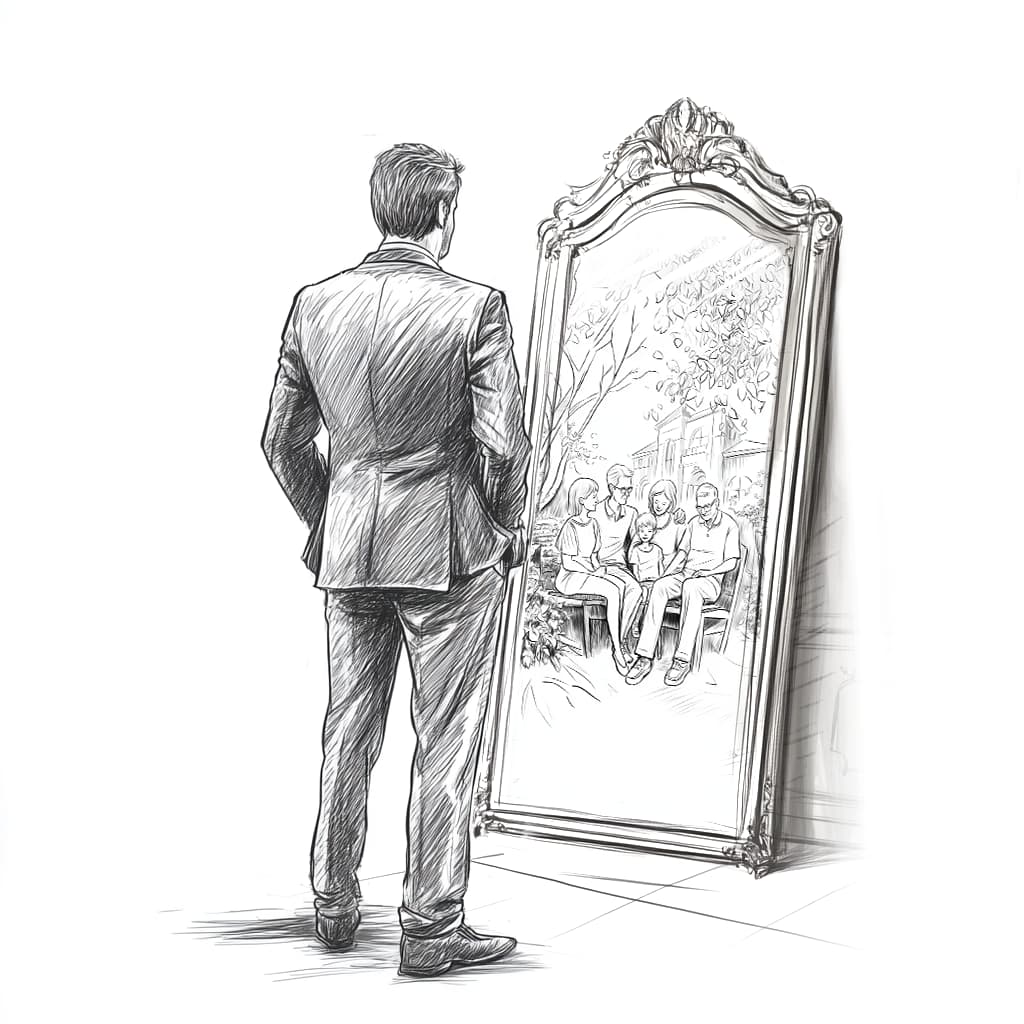The Legend
Long true story short
None of the characters are fictional. The events described have happened, and are still happening in real life.
Chapter one
The story of one boy
Many times, the grandfather told the boy: “Important matters are never urgent. Only if you didn’t do something in time.”

33 years ago, the boy was 12 years old. A happy childhood, the love of a big family, attention and care, a home, prosperity. His life seemed cloudless and secure.
The elders had attained their status through years of hard work. The boy didn’t understand this, and they never explained it.
Every Saturday, all relatives gathered in a large, cozy garden. This was the boy’s favorite day. Another meeting was about to occur, but the clouds suddenly got darker. The boy was told that a war had started. There was no need to worry; it was far away. Summer continued as usual, Saturday after Saturday. The war was still far away. The adults reassured each other. It felt like nothing had changed.
But on one Saturday, the adults decided that it was time to do something. They needed to save their families and assets — homes, money, property, bonds, jewels, bank deposits.
But none of that happened. Later that day, the war came to their doorstep. The line between “there’s still time” and “it’s already too late” turned out to be too thin. Everyone fled. All the relatives, and all the neighbors. Their close-knit clan was scattered across different countries. The lives of many people changed quickly and radically.
For 15 long years, the boy’s parents had been working on restoring at least a slight part of well-being of the family. Debts, pawnshops, side jobs, thriftiness, destitution were the boy’s mother's companions through all those years. The father was always traveling across the country and the world in search of income for the family.
Life went on. The boy grew up, studied law, and became an investment banker. He lived in 4 different countries. He didn’t settle anywhere. The family’s prosperity was restored. It took decades.
Chapter Two
The story of one Girl
In another country there lived a little girl. She was her grandfather’s favorite. He was the head of a large family, deservedly respected by everyone.

The summer of that year the girl remembered forever: it was spent in a basement under bombardment. Her sister was born there, and their brother grew up there. They are almost 40, but they still tremble at the sound of thunder and lightning.
The family fled. They couldn’t save anything but themselves. The collapse came unexpectedly. Money, homes, valuables, other property — everything was lost.
The girl lived in slums. She went to school, not knowing a single word of the new language. But she coped with everything. She got an education and started working multiple jobs. Gradually, life got a bit better.
Chapter Three
The Boy And The Girl
Neither the boy nor the girl ever returned to those places. 28 years later, they met on a street of a big city that had become their new home. Five years after their meeting, there were already five people in their family (now there are six).

Friends from childhood call me Yan. The girl is my wife, Lu. We talked a lot about how this had happened to our families. We were lucky; life goes on, and we’re not angering the heavens.
Childhood memories only resurface when we talk about our children and the children of our close friends. We worry about them. There’s no point in starting from scratch. It’s a waste of life’s energy. They should go further in life, not starting from zero, but from where their parents left off. For this to happen, parents must ensure that their children receive all their financial and social capital, all the assets and connections.
Our legend is both unusual and ordinary at the same time. Fortunately, only a few in our circle have such dramatic stories. But regardless of our friends' life paths, everyone is concerned about how to ensure that no misfortunes, that could happen to any of us at any moment, ever affect the lives of our families and children.
Labyrinth or vicious circle?
Not the super-wealthy, but wealthy and affluent families are the ones who are mostly at risk of losing their fortunes. This usually happens not because of business mistakes, but due to information asymmetry between family members.
Every year, the state of the world is becoming more and more vulnerable: recession, inflation, conflicts. The idea firmly took root in minds, that one needs to structure their capital and assets so that information about them could be transferred with a press of a button. Precise knowledge about all the assets and capitals would help family members access them quickly.
This should happen automatically, without any human intervention. Not too early, so that there's no temptation for the family members. And not too late, so the moment isn't missed. Precisely in time.
This brings peace of mind and allows one to live and work without looking back. In today's world, documents are easy to restore, but information is often impossible.

As an investment banker and lawyer, I thought I could find a solution. I tried every option — family offices, bankers, managers, trustees. Not to mention handwritten notes and computer spreadsheets. There was either too much human error, it was too expensive, unsafe, or ineffective, but usually it was all of these issues brought together.
We decided to create a program for ourselves. An old-fashioned safe, but with a modern twist. It balances contemporary technologies — smart contracts, blockchain, algorithms, cryptography — but is still very easy to use.
Everything only operates based on algorithms and triggers set by the asset owner. A digital assets data repository where information about all your assets is stored: at the selected time, it knocks on the doors of those you specified in advance and passes on exactly the information you entrusted it to pass.
We managed to create such an assets data repository. Then some friends joined in. They know the program is independent of its creators. Everything is ruled by blockchain.
Each family's information is stored on an assets data repository. Both the repository and the information only belong to them. And when the trigger set by the owner fires, nothing can stop the family members from receiving the information.
Labyrinth
Most likely, our efforts would have been in vain if it hadn’t been for the moment when modern technologies developed to the extent that they are able to solve a century-old problem. The problem of reliable, autonomous, and timely transmission of information about family assets to family members.
In 2022, unexpectedly for ourselves, the project outgrew the “family and friends” format and found demand from a broader circle.
Friends of friends appeared, as well as completely unknown families began to reach out and join us. That’s how we ended up here with you.
If you share our values, let us know. We can put you on a waiting list until the next subscription window opens. There are more people interested than we planned for, and the program's capacity is not expanding as quickly as we’d like.
This is our real story. If we ever meet in person, I would love to tell you all the details and listen to yours as well.
Yours Yan
January 2023

We have thought this issue might concern more than just us and our friends
Maybe it’s more broad than we thought? We decided to conduct a large-scale non-profit study on it. 13 500 people from 18 countries collectively spent 9 210 hours showing that the problem we solved for ourselves and our friends is not local at all. It concerns everyone. See for yourself.
79.4%
79.4% of capital founders assume that it will be impossible for their family members to comprehend information related to assets and capital
81.6%
81.6% of respondents do not take any actions to address information asymmetry between them and family members regarding asset and wealth information.
11.9%
Only 11.9% of wealth founders understand that in the future, their children will be obligated to undergo KYC procedures for both themselves and their parents, as family assets and capital must be traced from the very beginning, i.e., from the founding member's time
11%
In the modern world, comprehensive data on asset and capital hold greater importance than physical document copies However, this concept is understood by only 11% of responden
87.1%
87.1% of respondents keep records of personal and family capital at a poor or moderate level
23.8%
While 23.8% believe that family members could take possession only partially
89.1%
89.1% of respondents have doubts about whether trusted individuals and professionals will execute tasks in the best way possible when the time comes
71.4%
71.4% of capital founders are willing to depend on a third party, under the condition that it can be executed without human intervention. At present, there are no products or services that provide this capability
48%
48% of capital founders think that their family won't be able to take possession of capital and assets